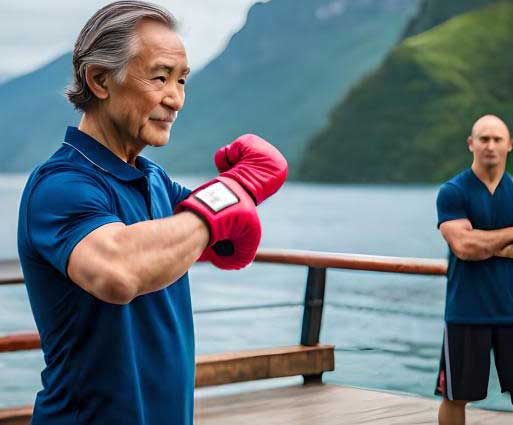When we speak of heavyweight boxers, we typically envision towering giants, athletes of immense stature, strength, and power.
Yet, in the annals of boxing history, there exist unique exceptions to this general rule. Among them, a figure stands out, a man who defied physical norms and conventions to become a celebrated heavyweight champion. We refer to none other than the shortest heavyweight boxer in history.
Contents
The Record: The Shortest Heavyweight Boxer of All Time
Dwight Muhammad Qawi, originally born Dwight Braxton, holds the record for the shortest heavyweight boxer of all time.
Standing at a height of merely 5’7″ (170 cm), Qawi’s stature was notably less than that of his heavyweight contemporaries. Yet, his shorter stature did not preclude him from achieving immense success in the ring.
Early Life and Path to Boxing
Born on January 5, 1953, in Baltimore, Maryland, Dwight Muhammad Qawi had a challenging upbringing.
His early life was filled with adversities, and he found himself embroiled in a life of crime. It was during his time in prison that Qawi discovered his talent and passion for boxing.
Upon his release, he pursued this passion relentlessly, ultimately leading him to the professional boxing ring.
Ascending the Ranks: From Light Heavyweight to Heavyweight
Qawi began his professional boxing career as a light heavyweight. He was a dominant force in this division, garnering the WBC and Ring Magazine light heavyweight titles.
His relentless style and ironclad defense, combined with his ferocious punching power, earned him the nickname “The Camden Buzzsaw”.
After a successful reign in the light heavyweight division, Qawi transitioned to the heavyweight class.
Despite his shorter stature, he managed to carve out a successful career, even contending for the world heavyweight title.
Qawi’s Boxing Style: A Lesson in Adaptation
In the boxing ring, Qawi was a marvel of adaptation. He understood that his shorter stature placed him at a disadvantage in the heavyweight division, where reach and height often dictate the outcome of matches.
Instead of trying to match the physical attributes of his taller opponents, Qawi embraced his uniqueness and developed a boxing style that capitalized on his strengths.
Qawi’s boxing style was characterized by his exceptional ability to slip punches and get inside his opponent’s reach.
His compact frame became an asset, allowing him to deliver powerful punches from close range. In addition, Qawi’s incredible durability and stamina, coupled with his relentless pressure, often wore down his opponents, leading to his victories.
Notable Matches and Achievements
Despite his size disadvantage, Qawi had several remarkable victories in his career. A notable match was against Matthew Saad Muhammad, where Qawi won the WBC Light Heavyweight title.
He also had a legendary bout against Evander Holyfield for the WBA Cruiserweight title, a match considered one of the greatest in cruiserweight history.
Legacy: An Inspiration for Future Generations
Dwight Muhammad Qawi left an indelible mark on boxing history. His achievements in the ring, despite his physical disadvantages, serve as a potent reminder that determination, skill, and heart often triumph over physical attributes.
His journey from a life of crime to becoming a world champion is a testament to the transformative power of sport and the human spirit.
Qawi’s story and his relentless spirit continue to inspire countless aspiring boxers worldwide, demonstrating that physical limitations can be overcome through perseverance, strategy, and sheer willpower.
Impact on Boxing Techniques and Strategies
Qawi’s successful career has had a profound influence on boxing techniques and strategies. His ability to adapt his style to his size and reach limitations has encouraged many boxers to recognize that boxing is not merely about physical attributes, but also about strategy, technique, and the effective use of one’s unique strengths.
The Struggles and Triumphs: Qawi’s Boxing Career
Qawi’s boxing career started off modestly, with a record of 1-1-1 in his first three professional fights. However, he did not let these early outcomes discourage him.
Instead, he embarked on a winning streak, securing 14 consecutive victories that eventually positioned him in the global rankings at light heavyweight.
One of Qawi’s most notable victories came on September 5, 1981, when he returned to Rahway to fight against James Scott.
The stakes were high, with the winner promised a shot at Matthew Saad Muhammad’s WBC world championship belt. Qawi emerged victorious, winning a unanimous 10-round decision.
This led to the pivotal match on December 19 of the same year, where Qawi faced Saad Muhammad for the WBC world championship belt.
Despite being the underdog against Saad Muhammad, a popular fighter of his generation, Qawi proved his mettle and defeated Saad on a 10th-round technical knockout, becoming a world champion for the first time.
Over the next 15 months, Qawi defended his title three times, knocking out Jerry Martin, Saad Muhammad a second time, and Eddie Davis.
However, his reign as the light heavyweight champion came to an end on March 18, 1983, when he lost a close but unanimous decision to WBA champion Michael Spinks in a unification bout.
The Move to Cruiserweight: A New Chapter
After losing his light heavyweight title, Qawi made the strategic decision to move up to the newly formed cruiserweight division.
This move was driven by his belief that the 175-pound weight limit of the light heavyweight division had physically drained him.
Free from the need to suppress his weight, Qawi achieved a series of wins and claimed the WBA cruiserweight title on July 7, 1985, knocking out Piet Crous in South Africa.
In the cruiserweight division, Qawi won two more fights, including a victory over former world heavyweight titlist Leon Spinks.
On July 12, 1986, he accepted a challenge from Olympian Evander Holyfield. The full 15-round fight resulted in a split decision in favor of Holyfield.
Life After Boxing: Making a Difference
Qawi’s boxing career continued for the next 12 years after his loss to Holyfield, but he never regained a world title.
After a short stint in the heavyweight ranks, he attempted to regain the cruiserweight title but was unsuccessful.
Qawi finally retired in 1999, at the age of 46, with a career record of 41 wins, 11 losses, and one draw, with 25 wins by way of knockout.
Upon retiring, Qawi began working at the Lighthouse, a drug and alcohol rehabilitation center in Mays Landing, New Jersey.
There, he works with both adults and adolescents, serving as a patient advocate and using his life experiences to inspire and help those struggling with addiction.
Conclusion: The Legacy of the Shortest Heavyweight Boxer
Dwight Muhammad Qawi’s journey from a life of crime to becoming a world champion in boxing is a testament to the transformative power of determination, discipline, and resilience.
His success in the boxing ring, despite his shorter stature, serves as a potent reminder that physical attributes are not always the sole determinant of success in sports.
His career has shown that with the right technique, strategy, and indomitable spirit, it is possible to transcend physical limitations and reach the pinnacle of one’s chosen field.
In the years following his retirement from professional boxing, Qawi has continued to impact lives positively, channeling his energy into helping those struggling with substance abuse.
His legacy thus extends far beyond the boxing ring, reaching into the realm of social service and community development.
Qawi’s story is one of overcoming odds, defying expectations, and reshaping narratives. It shows that size, while important in boxing, is just one aspect of a multifaceted sport that also values skill, strategy, and spirit.
Indeed, the story of Dwight Muhammad Qawi, the shortest heavyweight boxer, serves as an inspiration to all, irrespective of their field of endeavor, to never allow physical limitations to define their potential or cap their aspirations.
In conclusion, the tale of Dwight Muhammad Qawi is not just about boxing. It’s a human story of redemption, resilience, and relentless pursuit of excellence, teaching us that it’s not about how many times you get knocked down, but how many times you get back up.
Resources: Wikipedia





